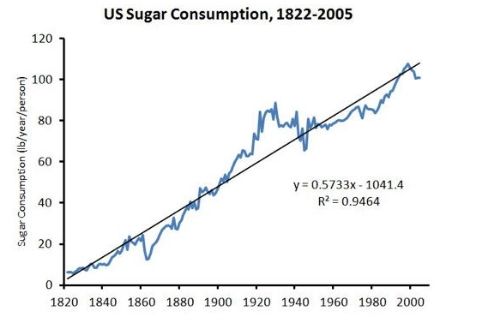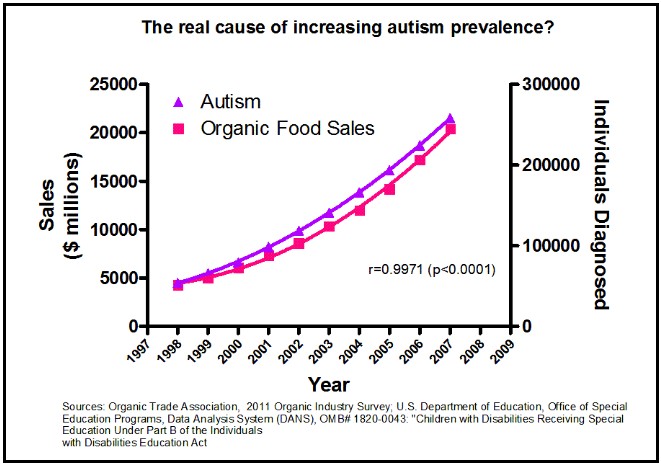Scapegoat of this decade: Sugar.
Options
Replies
-
Question: Since this is supposed to be about moderation.... how much is moderate?
http://www.heart.org/HEARTORG/GettingHealthy/NutritionCenter/HealthyDietGoals/Sugars-and-Carbohydrates_UCM_303296_Article.jsp
AHA is saying keep it to 100-150 calories of sugar a day, which comes out to like 25-38g a day.
So how much sugar is everyone eating?!
What counts as 'moderation?' Is it the 25g a day, which is apparently the recommendation of big American health institutes?
Checking out a few things and seeing that 1 pop tart gives you 17g, a banana gives you 14g, a regular-sized Snickers gets you 27g and a flavored Chobani greek yogurt will run you 19g.
Interesting to note.
I'd estimate my own sugar intake right around that 25-30g range per day, including fruit sugars.
I average about 125g (up to 200 sometimes) a day. About 500 calories a day which is about 1/7th or <15% of my diet.0 -
Question: Since this is supposed to be about moderation.... how much is moderate?
http://www.heart.org/HEARTORG/GettingHealthy/NutritionCenter/HealthyDietGoals/Sugars-and-Carbohydrates_UCM_303296_Article.jsp
AHA is saying keep it to 100-150 calories of sugar a day, which comes out to like 25-38g a day.
So how much sugar is everyone eating?!
What counts as 'moderation?' Is it the 25g a day, which is apparently the recommendation of big American health institutes?
Checking out a few things and seeing that 1 pop tart gives you 17g, a banana gives you 14g, a regular-sized Snickers gets you 27g and a flavored Chobani greek yogurt will run you 19g.
Interesting to note.
I'd estimate my own sugar intake right around that 25-30g range per day, including fruit sugars.
I'm probably taking in 75-100g a day. Not from fruit.
I don't actually like most fruits. I do like ice cream though.0 -
This is an amazing thread. Can we expand it to include the real Food Devil: Gluten? Because I think there are some crazies out there we haven't heard from, yet.
I'll get us started. Gluten is the source of all nutritional evil. I heard about it at an anti-gluten support group I attend, then read some blogs and books that reinforced my views. Feel free to look it up, it's all over the internet, so it must be true. Plus I saw this video: http://www.youtube.com/watch?v=oHg5SJYRHA0
http://www.youtube.com/watch?v=oHg5SJYRHA0
Discuss!0 -
Question: Since this is supposed to be about moderation.... how much is moderate?
http://www.heart.org/HEARTORG/GettingHealthy/NutritionCenter/HealthyDietGoals/Sugars-and-Carbohydrates_UCM_303296_Article.jsp
AHA is saying keep it to 100-150 calories of sugar a day, which comes out to like 25-38g a day.
So how much sugar is everyone eating?!
I don't track sugar but the reports section says I averaged about 28g per day in the past 30 days, which has been pretty typical. The low was 15 and the high was 45.
I don't log on the weekends. But, while I generally consume more calories on the weekends, I don't eat much more sugar.0 -
Propaganda, really? Is that what we call personal opinions based on scientific studies. Also, yes, they're blog posts, but did you notice the part where I specifically stated that there are usually links directly within the blog to the science it's based on? Are textbooks now propaganda simply because they are a bringing together of information in one easy to access place? At least read things before you start making unintelligent criticism.
In late, but yes - that's almost exactly what we call the bolded.0 -

That's almost as relevant as this one:
I'm not sure I'm convinced that your graph of organic food sales' correlation to autism is relevant to the discussion of sugar consumption. I am, however, pretty convinced that a graph of US sugar consumption over time is relevant to the discussion.
And now I am convinced that you cannot tell the difference between correlation and causation :flowerforyou:
:huh:
I was convinced after his/her first post.0 -
There is absolutely nobody saying anywhere that people should eat a diet of sugar. The argument this thread makes is that sugar is NOT the bogey man it's made out to be. Macros, calories, and nutrients being equal, a person who consumes sugar will not suffer wild health problems and die just because they choose to include a soda in their daily meal plan, like the anti-sugar zealots try and claim. Just the fact that you make the claim that the choice is between a "balanced diet" and a "diet of sugar" shows a lack of understanding of the topic. You're using a logical fallacy called "excluding the middle." A balanced diet can easily contain sugar, and for a human being with no medical conditions, moderate amounts of sugar will cause no harm. One does not have to choose between eating a healthy, varied diet, or eating just sugar.There have been just as many studies showing the opposite. Look them up sometime.
"Just a carb" is a statement that ignores quite a bit. While low glycemic diets are comparable to moderate glycemic diets in terms of weight loss, there have also been studies showing the weight loss to be slightly more efficient. Which is more efficient, I really couldn't say. I can say from personal experience that moving to a lower glycemic diet did seem to spur my weight loss a bit, though not grossly so.
But more important to people like me, the glycemic index is very important for diabetic dieting, and also those with liver conditions. One loosely-controlled human study I read of showed that a high glycemic diet alone was sufficient for the onset of fatty liver disease. There was another better controlled animal study that had the same findings. Food for thought for all you. Both studies can be found via google.
Is it possible to lose weight while eating sugar? Sure. I wouldn't argue otherwise, I've done it myself. Is it just as good to lose weight on a diet of sugar versus a better balanced diet? Not for me.0 -
Propaganda, really? Is that what we call personal opinions based on scientific studies. Also, yes, they're blog posts, but did you notice the part where I specifically stated that there are usually links directly within the blog to the science it's based on? Are textbooks now propaganda simply because they are a bringing together of information in one easy to access place? At least read things before you start making unintelligent criticism.
In late, but yes - that's almost exactly what we call the bolded.
Really? Because according to dictionaries, propaganda means "information, ideas, or rumors deliberately spread widely to help or harm a person, group, movement, institution, nation, etc."
I'm stating my personal opinion in what is supposed to be an intelligent discussion to represent a differing point of view. No deliberately wide spreading to help or harm anything here.0 -
The plausibility of sugar addiction and its role in obesity and eating disorders.
ncbi.nlm.nih.gov/pubmed/20056521
CONCLUSION:
There is no support from the human literature for the hypothesis that sucrose may be physically addictive or that addiction to sugar plays a role in eating disorders.0 -
That doesn't have an opposing view. It just hypothesizes that since it is demonstrated in animal models it might be possible in humans.The plausibility of sugar addiction and its role in obesity and eating disorders.
ncbi.nlm.nih.gov/pubmed/20056521
CONCLUSION:
There is no support from the human literature for the hypothesis that sucrose may be physically addictive or that addiction to sugar plays a role in eating disorders.
This is just a random study done by a doctoral student or some professor trying to support their claim for tenure. There are most likely many, many of the same types of studies done by other doctoral students with opposing views as well. Like this one:
http://www.ncbi.nlm.nih.gov/pubmed/17617461
All are pretty meaningless as far as 'proving' either claim.0 -
CONCLUSION:
There is no support from the human literature for the hypothesis that sucrose may be physically addictive or that addiction to sugar plays a role in eating disorders.
But ... but ... that's going to hurt my plan of convincing you that you have a problem, so that I can sell you my "solution."
Come on now. That's Sales Tactics 101.0 -
-
Sugar and processed junk foods are the cheapest and most prevalent foods out there. Most product manufacturer's could care less about the effects on the health of the people who consume their products. Chronically overeating sugar can and does lead to very serious health issues. The bottom line is there are usually much better food choices than those laden with processed chemicals, high fructose corn syrup, sugar, wheat, etc.
Does this mean all sugar is evil? Of course not. Your body breaks down the foods you eat into sugars. The problem is there is a lot of misinformation about what really is healthy. Cereal boxes with 50 grams of sugar per serving tout how "heart healthy" they are because the first ingredient is whole wheat. Pretty much any product can get away with misleading information and people will buy it.
Yes you can lose weight by calorie restricting no matter what foods you eat. Is eating nothing but twinkies really the best option, though? People seem to equate overall health with body fat percentage or scale weight. There is a lot more to health than just appearance and the number on the scale.
For me, I limit the processed foods I eat not only because I wanted to lose weight, but I wanted to become more healthy. I'm going to eat a certain number of calories per day and the best choices for me are lean proteins, vegetables, occasional fruits, and healthy fats. This way I can still eat a lot of food, my insulin remains stable and sensitive, I get a lot of micro nutrients in my food choices, and my overall health improves. My blood pressure goes down. My cholesterol is lower. My weight is down.
No one is perfect and I will occasionally eat what I know is crappy foods if I decide I want to. But it is occasional, it's not a habit and "everything in moderation" just doesn't work for me personally.
Sugar is the scapegoat, and "gluten free" is the latest misleading craze to charge more for foods. There is a reason, however, that these things have become the focus. The trick is to research and learn what works best for you. Do not trust that food manufacturers have your best interests at heart.0
Categories
- All Categories
- 1.4M Health, Wellness and Goals
- 391.3K Introduce Yourself
- 43.4K Getting Started
- 259.6K Health and Weight Loss
- 175.6K Food and Nutrition
- 47.3K Recipes
- 232.3K Fitness and Exercise
- 387 Sleep, Mindfulness and Overall Wellness
- 6.4K Goal: Maintaining Weight
- 8.5K Goal: Gaining Weight and Body Building
- 152.7K Motivation and Support
- 7.8K Challenges
- 1.3K Debate Club
- 96.2K Chit-Chat
- 2.5K Fun and Games
- 3.2K MyFitnessPal Information
- 22 News and Announcements
- 913 Feature Suggestions and Ideas
- 2.3K MyFitnessPal Tech Support Questions










